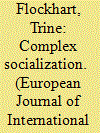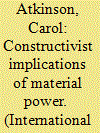| Srl | Item |
| 1 |
ID:
069083


|
|
|
| 2 |
ID:
073546


|
|
|
|
|
| Publication |
2006.
|
| Summary/Abstract |
The research presented in this article examines one aspect of state socialization, the extent to which transnational military-to-military interactions have served as an effective mechanism of the democratic political socialization of states. Military organizations are very interesting when we consider avenues by which state socialization might occur because military organizations are an influential part of governments, and members share common beliefs and values as soldiers and officers that transcend borders. Thus, it would seem that a state's military structure is one likely channel whereby politically relevant individuals might learn new ideas and have the capability to reform existing institutional structures. The socialization process described in this study is three level: (1) individuals acquire new ideas; (2) coercion, incentives, and persuasion aid in institutionalizing these ideas in the underlying political structure of the state; and (3) once institutionalized, these new ideas/identity of the state influence the material and ideational structure of international society. Using Cox Proportional Hazard models and an original data set encompassing over 160 states during the years 1972-2000, the analyses find U.S. military-to-military contacts to be positively and systematically associated with liberalizing trends. This finding provides evidence that constructivist mechanisms do have observable effects, and that ideationally based processes play an important role in U.S. national security.
|
|
|
|
|
|
|
|
|
|
|
|
|
|
|
|
| 3 |
ID:
155768


|
|
|
|
|
| Summary/Abstract |
Multinational Military Exercises (MMEs) are often viewed by states as opportunities to increase interoperability, improve cooperation, and solve common security problems. We argue that in addition to this, MMEs work as tools to shape the shared beliefs of coalition partners surrounding threat. Specifically, MMEs allow multinational forces to identify best practices, consolidate beliefs, and codify behavior through doctrine, typically by means of some institutional process. We examine our argument on MMEs through an analysis of various multinational and coalition partner efforts to identify security threats and cooperate through the development of common doctrine at the strategic, operational, and tactical levels of warfare. Our analysis suggests that the use of MMEs for doctrine development does help to socialize states in terms of identifying common threats and subsequently sharing a process by which to address them.
|
|
|
|
|
|
|
|
|
|
|
|
|
|
|
|